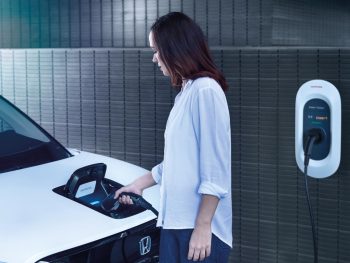Paying the penalty: How EU emissions targets could hit fleets
While new EU emissions regulations will see carmakers face major fines, fleet operators are also likely to see some impacts, reports Natalie Middleton.

Manufacturers can earn ‘Super Credits’ for each sub-50g/km vehicle sold, which count as two vehicles in 2020 and 1.67 vehicles in 2021
Carmakers may have faced more than their fair share of challenges in recent years – from falling demand and diesel demonisation to trade wars, tariffs, Brexit and WLTP – but 2020 will see things get a lot tougher; reshaping the face of the industry as fleets know it.
Not only is coronavirus (Covid-19) taking its toll on production and global supply chains, but also the EU’s 2021 ‘CAFE’ CO2 emissions targets have already started to be phased in this year and will apply to all registrations from 2021.
By their very nature, these strict targets – aimed at tackling global warming – are meant to be hard to meet, backed by punitive fines for non-compliance. In fact, latest research from PA Consulting indicates that Europe’s top 13 carmakers will see fines of some €14.5bn (£12.7bn) on the 2021 targets, which tighten up the existing 2015 targets to 95g/km for cars and 147g/km for vans.
The 95g/km is an average; the specific emission targets for each manufacturer use a complex calculation involving the average mass of their vehicles and unit sales.
According to PA Consulting, the fines are pretty hefty. Volkswagen could be fined as much as €4.5bn (£3.9bn), factoring in its high sales volumes across Europe, while Renault-Nissan-Mitsubishi, Volvo and Jaguar Land Rover – which benefits from some exemptions as it sells fewer than the benchmark 300,000 units a year – look set to fall short. Even Toyota, with its experience in hybrid vehicles, is forecast to miss its target. As such, the scale of fines for many will be enough to further affect their profitability.
But there are ways to circumvent the fines of €95 per gram of CO2/km over target, per car sold in Europe, including tie-ups over emissions credits. And manufacturers can also earn ‘Super Credits’ for each sub-50g/km vehicle sold, which count as two vehicles in 2020 and 1.67 vehicles in 2021.
From the fleet perspective, the impact of the fines is mixed, bringing positives in terms of a much swifter rate of electrification on manufacturer fleets; 2020 alone is set to see a large number of fully electric and sub-50g/km plug-in electric hybrids (PHEVs) launch.
Conversely, there are concerns over supply of such vehicles going forwards – not helped by existing battery supply issues or the impact of coronavirus – and we will see some carmakers exit some segments where it’s hard to reduce emissions; the Suzuki Jimny is likely to be pulled by 2021. There are also question marks over what happens post-Brexit transition period, when the UK is expected to mirror the targets going forwards but based on domestic registrations alone; without the ability to offset figures against more advanced EV markets such as Norway, could we see carmakers pull out of the UK?
According to Mark Jowsey, director – manufacturer liaison at KeeResources, the new targets will not only have major implications for manufacturers but potentially also for fleet operators.
He says: “With penalties for exceeding their targets risking billions of euros in fines, it will be far less costly for manufacturers to simply restrict sales of high CO2 models, or even to discontinue their sale in Europe. A further consequence is that some small cars with smaller capacity petrol turbo engines are proving difficult to improve beyond their current emissions, with some likely to be offered solely with electric powertrains.”
He also warns that the April switch to reduced Benefit-in-Kind for low-emission cars will further drive demand, leaving vast numbers of company car drivers hit by supply issues.
Jowsey adds: “The overall result is a big challenge for fleet managers seeking to reduce emissions, whilst still offering a reasonable choice to drivers, many of whom are pushing for a low-emission car.”
Peter Golding, managing director at FleetCheck, also says it’s probable that manufacturers will attempt to meet their targets by changing the mix of supply they bring to market.
“The effects are likely to be different from manufacturer to manufacturer,” he continues, “but the best-case scenario is that, because fleets overwhelmingly buy low-CO2 models in the first place, they will be largely unaffected. The worst case, however, is that they won’t be able to get the cars that they want and may have to take measures such as redrawing choice lists.
“What can be predicted with some certainty is that the situation is likely to become more acute as the year goes on and it becomes clearer to each manufacturer what they need to do to hit the targets. Some commentators have predicted that low-CO2 models will be brought to the market at lower prices to drive volumes.”
And David Bushnell, principal consultant at Alphabet, also warns the new regulations will require fleets to think and act differently moving forwards.
He explains: “It’s about moving to electrified vehicles where you can and moving to PHEVs to provide a ‘stepping stone’ technology towards zero-emission mobility for those employees with practical challenges, such as charging availability. If you’re not operating your fleet on a whole-life cost basis, then it’s now time to make the change, for the benefit of both your business and its drivers.
“The fleet industry has gone through a period of unprecedented volatility, uncertainty, complexity and ambiguity over the past few years but one thing is now absolutely certain – doing nothing or ‘doing what you’ve always done’ is no longer an option.”












